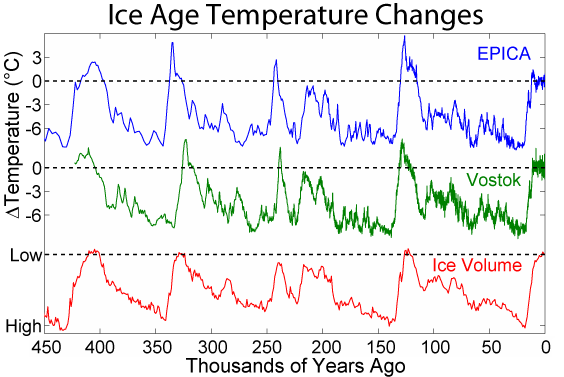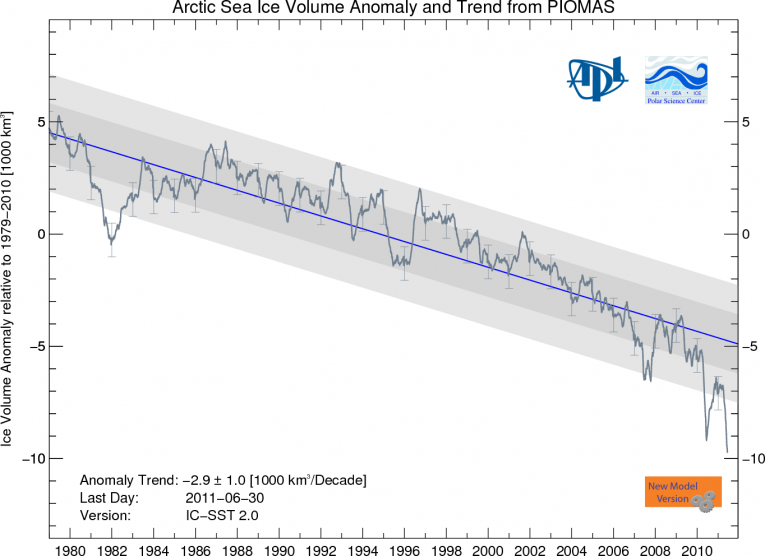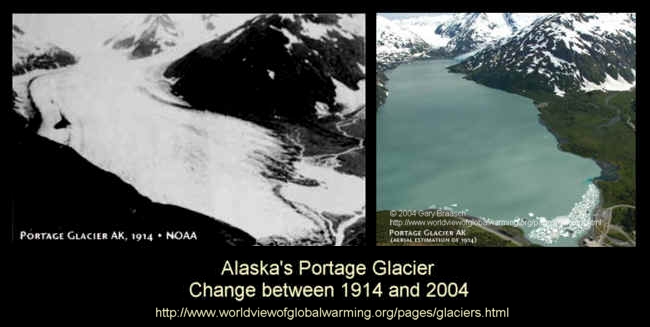I am sorry but I did not have the time to write my real/full replay to this thread.
It is possible that this might be shocking to some people but I am simply going to be pretty blunt about my thoughts perspective. However I will try to keep it simple and without too much detail.
If I have to place a bet I would almost certanly not place it on the next major ice age in our lifetime.
Here is what the
cryosphere today is showing. (for the 2th or August).
The arctic sea ice is growing every winter and melting back every summer. However the ratios in the proces are destabilized. What has resulted in a reduced ice cover in Arctic region. But as you can see not only that the extend is pretty low and that there is penty of open water but the quality and integrity of ice is also pretty bad. (feel free to explote this site there is interesting information on it)
So when you take a look at the estimated volume the problem becomes even more obvious.
As you can see the current year is well below any average even if the recent anomal years are calculated in. Plus it is obvious that the line for current year will end only a little bit above the black bottom line that represents ice free conditions.
So it will be interesting to watch the next month and a half since the is how long the melt season should last. (because under current conditions it is defined with orbital parameters instead of weather, weather is only the outcome)
But to be honest I am trully curious if we will see liquid water on the north pole in a few weaks from now. Since that is a possibility that is on the table.
But even if that does not happen the odds are that it will happen in some of the incoming years since the trend is speading downwards.
However this pictures shows the amount of change next to the average instead of the apsolute values. (the bottom line represents ice free condition)
Actually the ice all over the globe is not doing much better. So the most of glaciers around the world are in retreat . And only a few are progressing since the local wather and terrain structure. Plus it is too early for big melts on the Antartic.
So here are some school like examples of glacier melt during the 20th century.
Also if you are interested in this topic feel free to do you your own research with google. Some of the most interesting events in last 12 months are : great fires in Russia (this and last year) , the great flooding in Australa , Melting of glacier park, Methane bomb, Ocean acidification, The drought in Amazon basin in 2010 as well as recent droughts on the northern hemisphere.
However if you live in a big city and under climate conditioners you will probably not experiance any real changes. (except maybe food prices)
So here are the drought maps that showing the droughts created by recent anomal weather patterns and temperatures.
US
World in general
And this is one of the reasons why global warming has become such a controversy. You simply cant publish information like this without spreading massive panic. So you have to provide half truths in order to start changing something. So in the end when this passes throught the modern media machine you have what you have.
But back to the topic.
So the odds are that pretty much all ice will disapear in time. However that ice is keeping the world colder. Becuse of their temperature and the fact that ice reflects alot of energy back into space like a mirror. Plus as it melts in summer time it creates rivers and makes sure that vegetation can survive drough times. In the case that is not the case the vegetation simply dries up and turns into additional green house gases.
However there is one trick when it come to predicting the outcome based on gelogical data. The truth is that the graphs about recent ice ages are very good for understanding the geological past. But this graphs and models can't be used for our current situation.
The thing is that the graphs like the one that is posted here is correct. But the fossil fuels we are using were created over the last 700 million year.
But how long in the past does the the graph goes ? Only 450 thousand years.
Which means that today humas are releasing the carbon that was sealed under ground at that point, some 450 thousand years. Even when the dinosaurs died out 65 million years ago that is only a 10% of the time it took to create all those fossil fuels. Which means that the data from all those ice cores and similar stuff cant be trusted since the situation on the field is fundamentally different.
During the geologic history there has NEVER been a mechanism that is so good as human technology in extracting the carbon that has ended traped beneath the miles of rocks. What means that the current events have noting to do with classical/gradual natural changes, since basically the carbon is being pumped into the system at fast and faster rates.
Plus there is one more side effect of this. And that is that we cant go back and return things just as they were. The reason why we cant do that is because now we have much more carbon and its compounds in the system than we had some 200 years ago. However most of this carbon will end up in the carbon and other cycles what will create dramatic changes in those cycles. Especially since we are maining out fossil fuels wherever we find them. The problem is that we can even stop with this practice completely and sacrafice food and goods for the most of the world population and we would not solve the problem.
Since to do that we would need to destroy all crops and cities in order to plant the trees that used to exist in this area , plus we would need to find a technology that is capable of turning the carbon dioxide back into the oil so we can safely burry it back into the ground. But so far it seems that this would take a huge amount of energy we simply dont have, as well as the end of all political models we know and massive global genocide which goal would be to kill about 5-6 billion people.
So I think that it is far more likely that the current practice will continue and the result of that will be that we will release most of carbon that was removed from the biosphere during the last 700 million years.
However with that much carbon (with will end up as a green house gas) is hightly unlikely that there will be any kind of a ice age in the near future. It is possible that warming can backfire but that is pretty unlikely to happen if we have a situation we have today on this planet. It is possible that some cold air can come down from the pole while there is still ice there and that it mixes with air that has more moisture , resulting in a epic snow storms. Or it can happen that the ice melt and that the cold water that was created in the proces is distributed around ocean with the help of ocean currents. But all of that is simply not enough to turn the course of battle between hot and cold.
So if we trully relaease most of carbon stored underground it will bacially be impossible for ice to exist on the surface on the planet. Which is because we have overloaded the system. However in the new world most of the current organisms can survive . Many were viped out with human expansion and now the climate shock and snaping of food chains could be enough to crash the biosphere. As I said feel free to google "ocean acidification". In the case that they have millions of years to adap and in the case that humans dont destroy everything they touch and release aditional carbon they could manage just as they did before over the Earths history.
But as it seem for now this will probably be too much for the most of living beigns on the planet.
What means that the humans that will survive will be completely dependant on technology. Which is because the world and life as will know it will not exist anymore. So in the end the only thing you basically have is society that survives complete because of technology and as a consequance they merge more and more with their technology , creating Borg like society that will spread itself over the universe in the incoming billions of years.
Just my 2 cents.



















